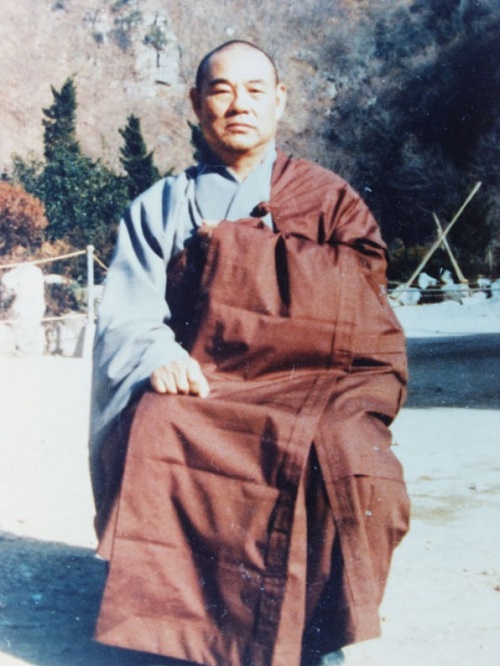ZEN MESTEREK ZEN MASTERS
« Zen főoldal
« vissza a Terebess Online nyitólapjára

향곡혜림 / 香谷蕙林 Hyanggok Hyerim (1912-1978)
(Magyar átírás:) Hjanggok Hjerim
Zen Master Hyanggok
http://www.seon.or.kr/english/210.htm
Hyanggok Haerim (1912-1978) entered Naewŏnsa Monastery at the age of 16, and he listened to a lecture delivered by Zen Master Unbong. Although Unbong's lecture was totally incomprehensible to him, the words remained in his mind as a doubt. In this way, he arduously practiced asceticism day and night after his daily work. His enlightenment came relatively early, when he was an initiate who had not even had his head shaved. It came with the numbing strike of a gust of wind against the door of the monastery. His mind's eye opened and he knocked on the door of the head of the Meditation Hall. Master Unbong, figuring out what had happened, pointed to a wooden pillow in the room, exclaiming, "Shout out what you saw!" Hearing this, the initiate kicked the wooden pillow. "Say it again!" the Zen master urged.
"They have deceived me, the Buddhas and Zen Masters! Tens of millions of discourses have been nothing but the presentation of dreams in dreams!" Zen Master Unbong showed great delight and from then on Sŏnim Hyanggok attended him and received his kind tutorship. Before entering nirvana, Zen Master Unbong conferred a poem of transmission on him and gave him the dharma name of Hyanggok:
付香谷蕙林丈室
西來無文印
無傳亦無受
若離無傳受
烏兎不同行On Behalf of Hyanggok Hyerim
The letterless seal
Coming from the West
Is neither to be transmitted
Nor inherited.
If you detach from not being transmitted nor inherited,
Crows are flying and
Rabbits are running!
In 1947, at Pongamsa Monastery in Munkyŏng, in the northern part of south Korea, Sŏnim Hyanggok organized a study group of serious Zen adepts and declared with determination, "Setting all established knowledge aside, I want all of us to make a fresh attempt to solve the profound stage of the hwadu, by which we will be able to rank with Buddhas and the preceeding Zen Masters." They set out on the road of hard study. One day, one of the students of Zen meditation asked of him: "If you kill a dead man to the utmost degree, you will see a man alive; If you save the life of a dead man to the utmost degree, you will see a man dead. (殺盡死人方見活人; 活盡死人方見死人) Stuck on this difficult kongan, he tried tackling it with all his might, deeply concentrating as if he were a dead man. One day as he was walking around the area, he saw his two hands shaking, and his mind opened wide and clear. He composed a poem describing the state of his enlightenment, singing:
忽見兩手全體活
三世佛祖眼中花
千經萬論是何物
從此佛祖總喪身鳳岩一笑千古喜
曦陽數曲萬劫閑
來年更有一輪月
金風吹處鶴唳新The whole world appears as it is
With the sight of two hands shaking.
Buddhas of the past, present, and future
Are nothing but illusory flowers.
What on earth is all this about--
Thousands of Scriptures and dharma discourses?
They lost their lives
Going after these illusions.A hearty laugh at Pongamsa
Is the supreme delight of all ages.
The valleys of Mount Huiyang
Have beeb peaceful for millions of years.
Will there again be another year,
The full moon as round as
The wheel of a cart?
Where gold wind is blowing,
The cry of a crane is fresh again.